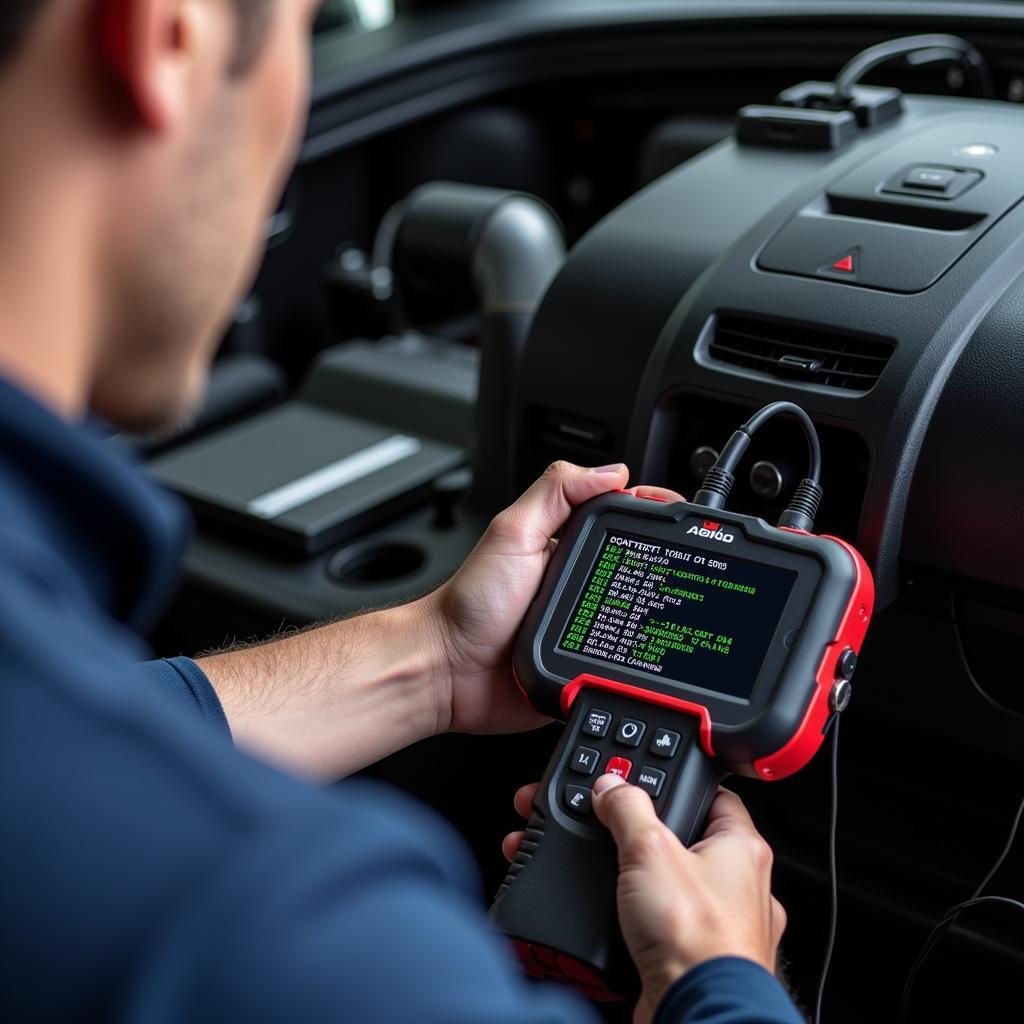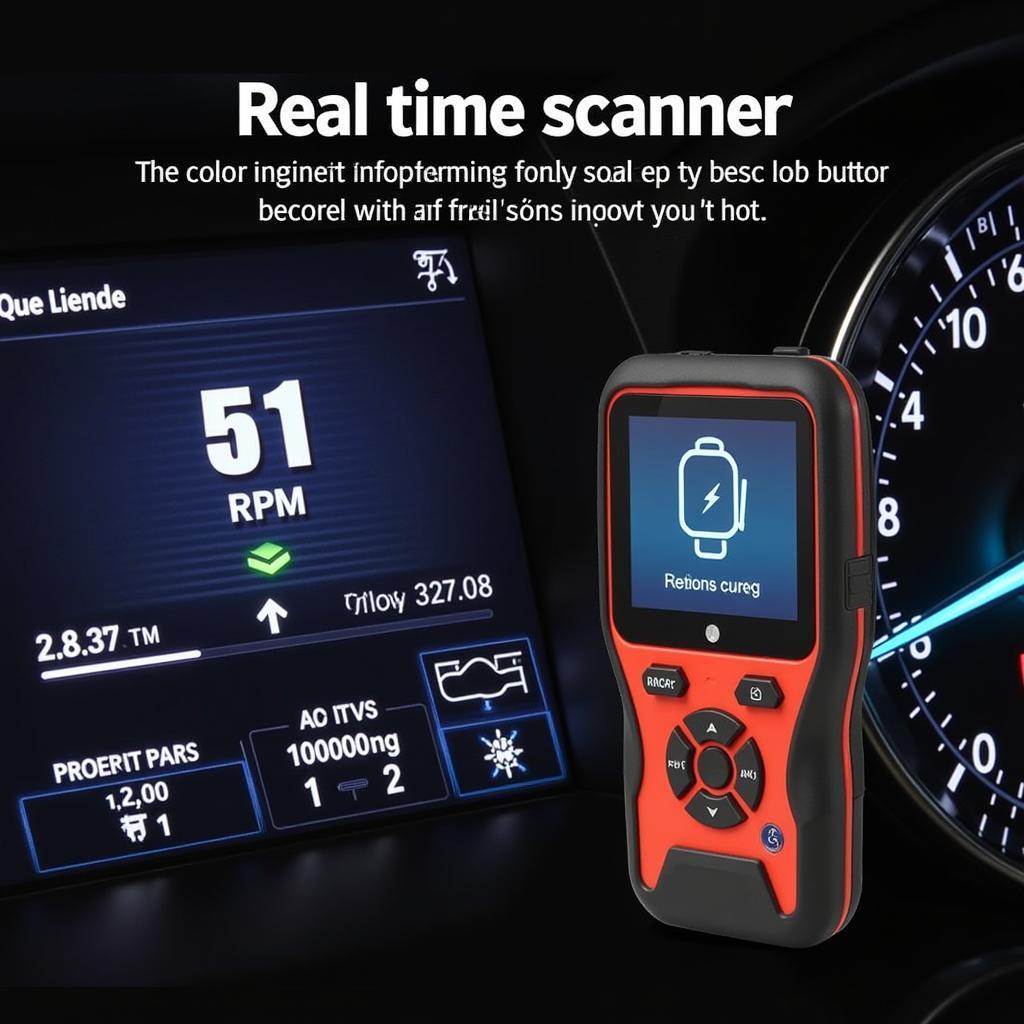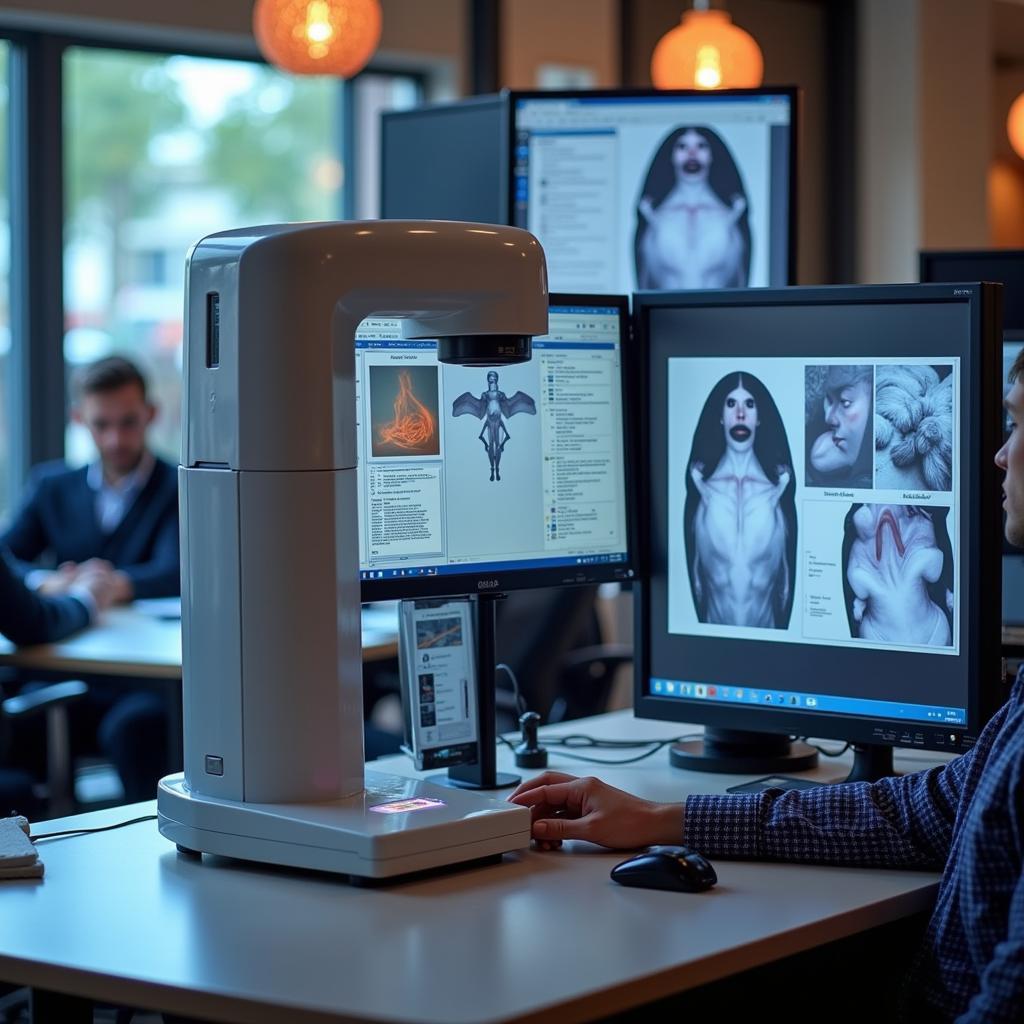Finding the Best Portable Car Diagnostic Scanner can be overwhelming, especially with so many options available. Whether you’re a seasoned mechanic or a car enthusiast looking to troubleshoot your own vehicle, having a reliable diagnostic scanner is essential. This guide will delve into everything you need to know about portable car diagnostic scanners, helping you make an informed decision and find the perfect one for your needs.
What is a Portable Car Diagnostic Scanner?
A portable car diagnostic scanner, also known as an OBD2 scanner, is an electronic device that connects to your car’s onboard computer system via the OBD2 port. This port, typically located under the dashboard on the driver’s side, allows the scanner to communicate with your car’s computer and retrieve valuable data about its performance.
 Mechanic using a portable car diagnostic scanner on a car
Mechanic using a portable car diagnostic scanner on a car
Why Do You Need a Portable Car Diagnostic Scanner?
Owning a portable car diagnostic scanner can be incredibly beneficial for several reasons:
- Diagnose Car Problems: The most obvious benefit is the ability to read and understand diagnostic trouble codes (DTCs). These codes, displayed as a combination of letters and numbers, provide insights into potential issues with your engine, transmission, emissions system, and other critical components.
- Save Money on Repairs: By diagnosing problems yourself, you can avoid unnecessary trips to the mechanic and potentially save hundreds of dollars in diagnostic fees. You’ll know exactly what needs fixing before taking your car to a professional.
- Prevent Future Issues: Regular scans can help identify minor problems before they escalate into major repairs. This proactive approach can save you time, money, and potential headaches down the road.
- Enhance Car Performance: Some scanners offer advanced features like live data streaming, allowing you to monitor various engine parameters in real-time. This information can help optimize your car’s performance and fuel efficiency.
- DIY Car Maintenance: For car enthusiasts, a portable scanner empowers you to take control of your vehicle’s maintenance. You can reset the check engine light after repairs, monitor sensor data, and gain a deeper understanding of how your car functions.
Types of Portable Car Diagnostic Scanners
Portable car diagnostic scanners come in various types, each catering to different needs and budgets:
1. Basic Code Readers:
As the name suggests, these scanners primarily read and display DTCs. They are the most affordable option, ideal for car owners who want a basic understanding of their car’s health.
2. Mid-Range Scanners:
These scanners offer more features than basic code readers, including the ability to clear DTCs, view live data streams, and access manufacturer-specific codes. They strike a good balance between price and functionality.
 A close-up of a mid-range car diagnostic scanner displaying live engine data.
A close-up of a mid-range car diagnostic scanner displaying live engine data.
3. Professional-Grade Scanners:
Designed for professional mechanics and experienced DIYers, these scanners offer the most comprehensive functionality. They can perform advanced diagnostics, program modules, and access all vehicle systems. They often come with software updates and technical support.
Choosing the Right Scanner for Your Needs
With so many options, choosing the best portable car diagnostic scanner can seem daunting. Consider these factors:
- Your Budget: Determine how much you’re willing to spend, keeping in mind that more features often come at a higher price.
- Your Skill Level: If you’re new to car diagnostics, a basic code reader or a mid-range scanner might suffice. For advanced users, a professional-grade scanner offers greater flexibility.
- Vehicle Compatibility: Ensure the scanner you choose is compatible with your car’s make, model, and year. Most scanners are compatible with OBD2 vehicles manufactured after 1996.
- Features: Consider the features you need, such as live data streaming, ABS and airbag diagnostics, and manufacturer-specific code reading.
- User Friendliness: Look for a scanner with a clear display, intuitive interface, and easy-to-use buttons or touchscreen controls.
- Brand Reputation: Opt for a reputable brand known for producing reliable and accurate diagnostic tools.
Top Features to Look for in a Portable Car Diagnostic Scanner
When comparing different scanners, keep an eye out for these essential features:
- Code Reading and Clearing: The ability to read and clear DTCs is fundamental to any car diagnostic scanner.
- Live Data Streaming: This feature provides real-time insights into engine parameters like RPM, coolant temperature, and oxygen sensor readings.
- ABS and Airbag Diagnostics: Some scanners can access and diagnose problems with the Anti-lock Braking System (ABS) and airbag systems.
- Manufacturer-Specific Codes: Accessing manufacturer-specific codes provides more in-depth diagnostic information beyond generic OBD2 codes.
- Software Updates: Regular software updates ensure the scanner remains compatible with new car models and includes the latest features.
- Data Logging and Playback: This feature allows you to record and review diagnostic data, which can be helpful for troubleshooting intermittent problems.
 A mechanic is shown analyzing diagnostic data on a professional-grade car scanner in a workshop setting.
A mechanic is shown analyzing diagnostic data on a professional-grade car scanner in a workshop setting.
Conclusion
Investing in the best portable car diagnostic scanner can empower you to take control of your vehicle’s health, saving you time and money in the long run. Whether you’re a DIY enthusiast or simply want to be more informed about your car’s condition, a reliable diagnostic scanner is an invaluable tool. By understanding your needs, researching different types and features, and choosing a reputable brand, you can find the perfect scanner to keep your car running smoothly for years to come.
FAQs about Portable Car Diagnostic Scanners
1. What is the OBD2 port?
The OBD2 port, or On-Board Diagnostics port, is a standardized 16-pin connector found in most vehicles manufactured after 1996. It allows external devices like diagnostic scanners to communicate with the car’s computer and access data.
2. Will any scanner work with my car?
Not all scanners are universally compatible. Ensure the scanner you choose is compatible with your car’s make, model, and year.
3. Can I fix any car problem with a diagnostic scanner?
While scanners can diagnose problems, they don’t fix them. They provide valuable information to help you understand the issue, but repairs may require mechanical expertise and tools.
4. How often should I scan my car?
It’s generally recommended to scan your car at least once a year or whenever the check engine light illuminates.
5. Can I update the software on my scanner?
Many scanners offer software updates, often through the manufacturer’s website. Updates ensure compatibility with new car models and may include new features.
Need More Help?
For expert advice on choosing the best car diagnostic tools, explore our other helpful resources:
- Best Professional Car Scanner Diagnostic Tool
- Best Car Diagnostic Scanner 2020
- Best Car Diagnostic Tool 2020
- Best Diagnostic Machine for All Cars
- Best Car Diagnostic Tool Available the Market UK
Still have questions? Contact our team of experts on WhatsApp: +1(641)206-8880, or Email: [email protected]. We’re available 24/7 to assist you.

Leave a Reply